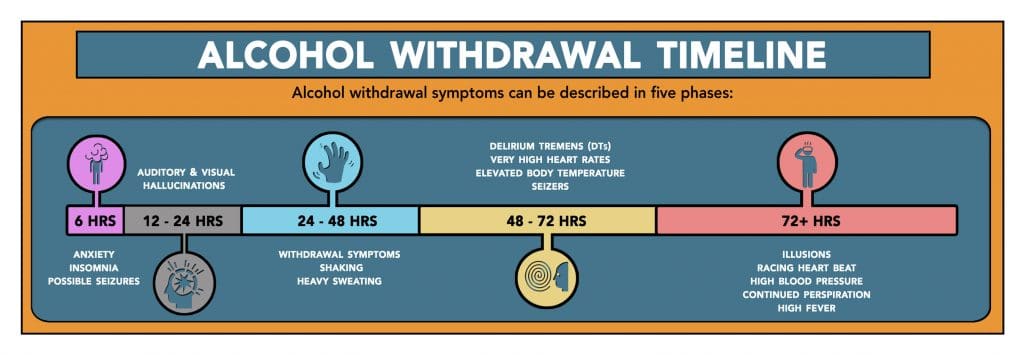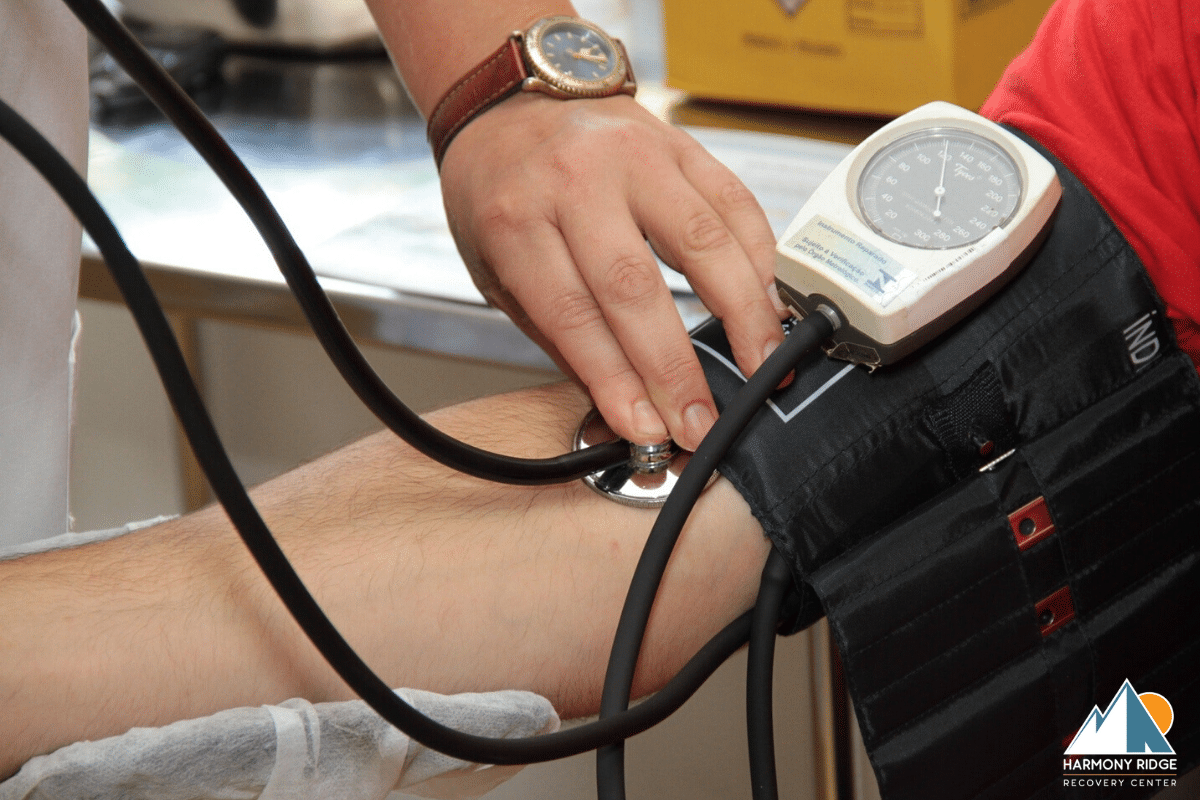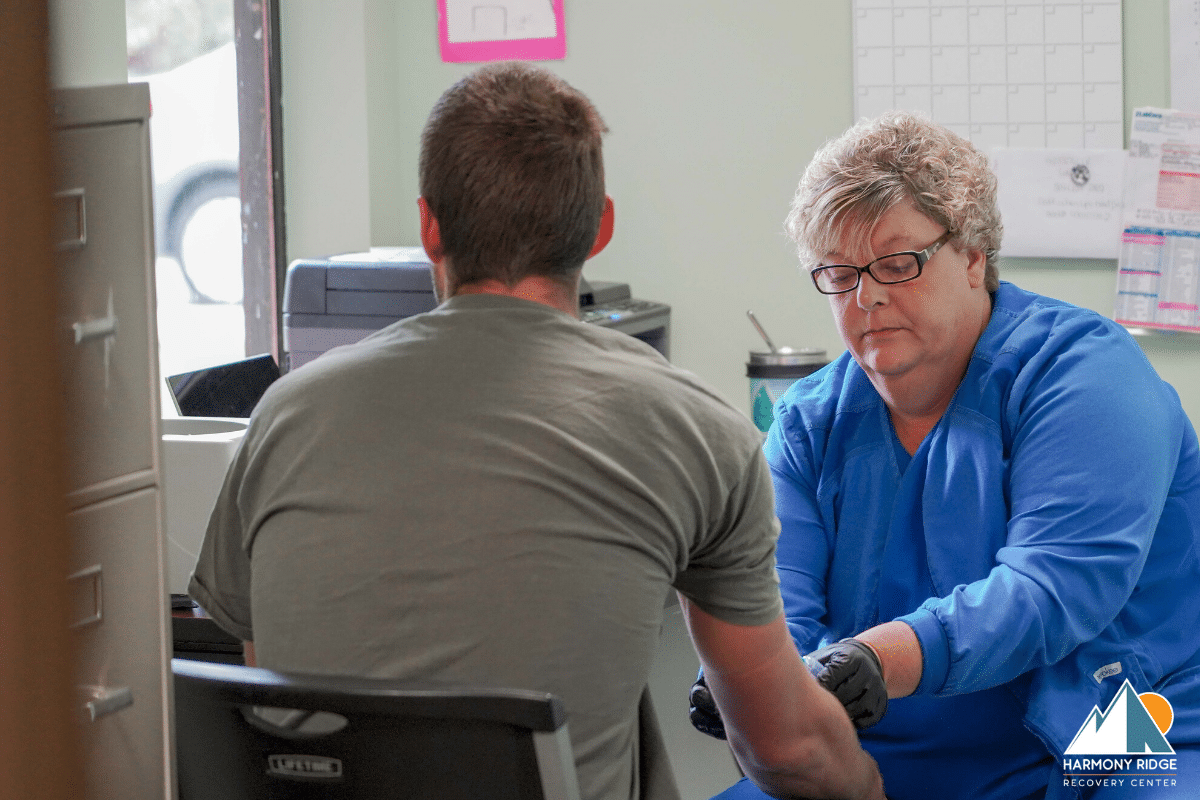Alcohol withdrawal and treatment
Our specialized programs are designed to address the unique challenges of alcohol dependence and provide the necessary care and guidance to help you achieve lasting sobriety.
Treating an AUD (Alcohol Use Disorder) is not as easy as one may think. While many people may think that this is something that can be achieved at home, it’s advised that those with an AUD detox from alcohol in a licensed medical treatment center.
People who have consumed substantial amounts of alcohol over time are at risk for severe alcohol withdrawal symptoms when discontinuing consumption. Depending on how severe the AUD is, a person can experience signs of withdrawal within just a few hours after his/her last drink.
Severe alcohol withdrawal symptoms include seizures, hallucinations, and delirium. Therefore, it’s important to detox from alcohol under the supervision and monitoring of medical professionals who specialize in addictions.
Do You Still Need Treatment After Detox?
Studies have shown that those who complete detox without a treatment program are more likely to suffer a relapse. Many people wonder whether rehab or detox is best for treating alcoholism. Both are usually required. A comprehensive recovery program will comprise detox, rehabilitation, and aftercare. The longer you stay in some type of treatment, the better your long-term prospects.
Alcohol Detox and Withdrawal Timeline
Detox is a key first step for people with AUD. The goal is to stop drinking and allow your body the time it needs to get the alcohol out of your system. When you suddenly stop drinking, you will probably develop withdrawal symptoms. This can begin while you still have alcohol in your blood.
Medical supervision is necessary because of withdrawal symptoms such as:
- Shaking (tremors), especially in the hands
- Hallucinations, when you see and hear things that aren’t there
- Anxiety
- DTs (Delirium terms) is a life-threatening issue that can cause restlessness, confusion, and cause fever, seizures, and hallucinations
- Sleeping problems
- Unstable changes in blood pressure and heart rate
Withdrawal Timeline
6 Hours--Minor withdrawal symptoms begin about six hours after your last drink. These symptoms include anxiety, headache, insomnia, nausea, and abdominal pains. Those with long histories of heavy drinking could have a seizure as soon as 6 hours after ceasing alcohol consumption.
12 to 24 Hours–A small number of people experience auditory and visual hallucinations at this point.
24 to 48 Hours–Minor withdrawal symptoms continue during this period. Additional symptoms may include shaking and heavy sweating.
48 to 72 Hours–People can experience delirium tremens (DTs) or alcohol withdrawal delirium during this phase. A very high heart rate, elevated body temperature, and seizers.
72 Hours–This is the phase when alcohol withdrawal symptoms are most severe. People may experience illusions (seeing things that aren’t there) and a racing heart. High blood pressure, continued perspiration, and fever may also occur.
A patient is more likely to stick with a detox program when there is a lot of help available. Detox support is meant to get the person mentally and physically stable. Blood pressure, temperature, heart rate, and breathing are all checked repeatedly during the detox process. The ultimate goal of detox is to prepare the patient for a treatment program so he can learn to break the addiction.
Patients are monitored 24-hours a day in order to safely eliminate alcohol from their systems. If a patient experiences alcohol withdrawal symptoms, our caring and compassionate staff is there to administer medications that will offset the withdrawal symptoms and make the patient as comfortable as possible.
It’s important to mention that each patient is different, and depending on various factors, the length of time it takes to successfully detox from alcohol will vary. Some patients may need only a few days, while others may need weeks to successfully detox from alcohol.
Alcohol Use Disorder Treatment Options
The two basic methods of quitting alcohol use are, quitting on your own, or seeking professional help.
Do-it-yourself/Cold Turkey—Some people with an alcohol issue manage to reduce their drinking and even abstain without professional medical help. A person with alcohol use disorder will find this is not a successful method.
Counseling/Professional Help—A qualified counselor can help you prepare a plan to handle your particular issues. Some common therapies include:
- Cognitive Behavioral Therapy (CBT)—CBT focuses on changing your automatic negative thoughts that add to your difficulties. Through CBT the negative thoughts are identified, questioned, and replaced with more objective, realistic thoughts.
- Family Therapy—Treatment experts advise that substance abuse counselors include family therapy techniques in treatment. If the family members don’t get involved in learning about alcohol use disorder and its role in the family dynamics, it might obstruct the alcoholic’s recovery. They might continue their dysfunctional or enabling behaviors.
- Dialectical Behavior Therapy (DBT)—DBT is based on CBT but with more of a focus on emotional and social features. It was developed to help people deal with extreme or unstable emotions and harmful behaviors.
Dual Diagnosis for Co-Occurring Conditions
You may have, and probably do have, underlying mental health issues. Problems with self-esteem, depression, bipolar disorder tend to go hand-in-hand with alcohol dependence. There are also some common physical issues such as hypertension, liver diseases, and possibly heart disease that would need to be treated at the same time.
Residential Treatment
Once you have completed detox, the next step in the recovery process is inpatient treatment. You will feel great after successfully detoxing; however, it’s important to remember that this is not the time to go home. That’s because you are no longer experiencing alcohol withdrawal symptoms. Although you feel great, it’s necessary to address the factors that caused you to develop an alcohol addiction.
Residential programs provide expert professional help, family, group, and individual therapy, and many other therapies for treating alcohol abuse. In a residential program, you will live at the facility for 1 to 3 months. Living in a structured, controlled environment removes you from the temptations and stressors that might trigger a relapse.
Intensive Outpatient Program (IOP) and Partial Hospitalization Program (PHP)
These programs are often used as a step-down level of care for patients who have completed a residential program and still need ongoing treatment. It can also be the first choice for people whose alcohol use is not as severe. Meaning, the patient hasn’t been using for an extended period and hasn’t been increasing in tolerance.
In a PHP or IOP, you won’t be living at the treatment facility, but you will be closely monitored by your counselor. You will be attending therapy sessions and counseling approximately 30 hours per week during the day. This is also fine for people who have a strong support system at home and have work or school obligations. Some facilities provide flexible day or night schedules.
Outpatient Program (OP)
This level of care is less intense than IOP. Outpatient is a less-expensive option and is generally safe and effective for people with a mild to moderate alcohol dependence. It works best if your mental and physical health is good; you have family support and don’t have a long history of alcohol dependence. It can be used as a step-down from IOP. Patients have more freedom and fewer counseling sessions per week. The patient continues to practice coping with life without the influence of alcohol.
Continuing Care
Staying in some type of program greatly influences your ability to stay abstinent. Many facilities offer some type of aftercare program. It may be a sober living home, alumni groups, or continuing counseling. Membership in a 12-step support group like AA has been shown to be extremely beneficial in preventing relapse.
Risk of Relapse
Although the goal is to prevent relapse and continue to live a sober life, the truth is that relapses after treatment are common. Addiction is a chronic disease, and the risk of relapse is the same as with any other chronic disease such as asthma or heart disease. Between 40 to 60% of people who have had treatment for AUD will relapse. The highest rate for relapse is during the first year.
How Much is Too Much?
The United States’ definition of a standard drink is a beverage containing 0.6 ounces of pure alcohol. However, most people’s “standard drink” contains substantially more alcohol, meaning that they are likely consuming more than the recommended amount of alcohol per drink.
The CDC estimates that 88,000 people per year die from alcohol-related causes (Ingraham, 2017). Furthermore, the CDC defines heavy drinkers as women who consume eight or more drinks per week and men who consume fifteen or more drinks per week. However, there seems to be confusion when it comes to accurately defining a drink
Depending on the amount of alcohol one is consuming, the side effects may vary. It’s also important to note that those suffering from an AUD can experience both short and long-term side effects.
Short-term alcohol side effects include:
• Injuries from motor vehicle accidents, falls, drownings, etc.
• Violence including sexual assault, domestic violence, suicide and homicide
• Alcohol poisoning
• Slurred speech
• Decreased hand/eye coordination
• Blackouts
• STD’s including HIV due to risky sexual behavior such as unprotected sex or sex with multiple partners
• Miscarriages and fetal alcohol spectrum disorders (FASDs) among pregnant women
Long-term alcohol side effects include:
• Permanent brain damage
• High blood pressure
• Heart disease
• Heart attack
• Heart failure
• Stroke
• Irregular heartbeat
• Osteoporosis
• Diabetes
• Cancer
What We Offer at Harmony Ridge
Detoxing from an AUD in the safety of a licensed recovery center is ideal for the safety of the patient. At Harmony Ridge Recovery Center, we recognize that patients are most vulnerable to withdrawal-related complications during the detox process. This time is crucial, and we take every precaution to ensure that you or your loved one is safe and comfortable during the detoxification process.
Patients are monitored 24-hours a day in order to safely eliminate alcohol from their systems. If a patient experiences withdrawal symptoms, our caring and compassionate staff is there to administer medications that will offset the withdrawal symptoms and make the patient as comfortable as possible.
We specialize in individualized alcohol treatment plans because each patient will need a treatment plan that will work for his/her specific needs. During residential alcohol treatment, we focus on identifying the root cause that contributed to a patient turning to alcohol abuse. Using evidence-based treatment methods, we address each patient’s entire mind, body, and soul during the recovery process.
Our Goals are Your Goals
Our goal is to help our patients reclaim their lives that have been derailed due to the disease of addiction. In addition to 24-hour care, patients have access to daily group therapy, individual therapy, cognitive-behavioral therapy (CBT), music and art therapy, adventure therapy, and outdoor therapy.
We recognize that proper nutrition is essential to leading a healthy lifestyle, so our patients receive nutrition and wellness education – vital life skills that they can take home with them. Harmony Ridge Recovery Center proudly offers family and relationship counseling in addition to life skills and educational workshops designed to make the transition back home as smooth and successful as possible.
The primary goal of a residential recovery program is for the patients to focus entirely on themselves and their recovery. Our team recognizes the importance of providing residential patients with a variety of amenities since Harmony Ridge Recovery Center will be their home away from home during the recovery process.
Patients enjoy a swim in our indoor heated pool, arcade/gaming room, full cafeteria, and recreational hall. You will live in a spacious cabin just steps away from our medical/clinical building.
If you’re more into the great outdoors, we offer fishing, hiking, kayaking, basketball courts, and other outdoor activities that will be sure to help you along your journey to recovery. If you’re more of a bookworm, we have plenty of books for you to enjoy in our Mountain View Villa overlooking the tranquil woods in the valley.
It’s safe to say that there’s something for everyone at Harmony Ridge Recovery Center, and we look forward to helping you achieve a fulfilling life free from the restrictions of alcohol addiction. For more information, please contact us. You have been looking for us and we are waiting for you.
References:
https://www.washingtonpost.com/news/wonk/wp/2017/08/11/study-one-in-eight-american-adults-are-alcoholics/?noredirect=on
https://www.healthline.com/health/alcoholism/how-long-does-it-take-to-detox-from-alcohol
Jump To Section
Begin Your Journey to Healing Here
Ask me about recovery, I can help you!
Our recovery specialists are standing by 24/7 to help you or your loved one.
Or call us: 








